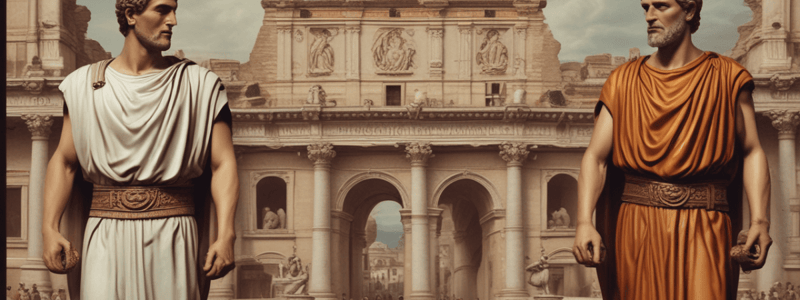Podcast
Questions and Answers
What was the primary reason for the formation of the Second Triumvirate in 43 BCE?
What was the primary reason for the formation of the Second Triumvirate in 43 BCE?
- To avenge Julius Caesar's assassination and eliminate his assassins (correct)
- To establish the Roman Empire
- To prevent the rise of the Roman Republic
- To promote the Pax Romana
What was the consequence of being listed on the proscriptions during the Second Triumvirate?
What was the consequence of being listed on the proscriptions during the Second Triumvirate?
- Confiscation of property
- Elevation to senatorial rank
- Granting of citizenship
- Execution or exile (correct)
What was the outcome of the Battle of Philippi in 42 BCE?
What was the outcome of the Battle of Philippi in 42 BCE?
- The battle was inconclusive, leading to a stalemate
- The Triumvirate defeated Brutus and Cassius, who committed suicide (correct)
- The Triumvirate was forced to surrender
- The Triumvirate was defeated by Brutus and Cassius
How did Octavian ultimately consolidate his power in Rome?
How did Octavian ultimately consolidate his power in Rome?
What was the result of the Second Triumvirate's proscriptions and civil wars?
What was the result of the Second Triumvirate's proscriptions and civil wars?
What was the period of relative peace and stability established by Augustus?
What was the period of relative peace and stability established by Augustus?
Study Notes
Formation And Members
- Formed in 43 BCE, after the death of Julius Caesar
- Comprised of three members:
- Octavian (later known as Augustus)
- Mark Antony
- Marcus Aemilius Lepidus
Conspiracies And Assassinations
- The Second Triumvirate was formed to avenge Caesar's assassination and eliminate his assassins
- Proscriptions: lists of people declared enemies of the state, subject to execution or exile
- Many prominent Romans, including Cicero, were executed or forced into exile
Proscriptions And Civil War
- The Triumvirate launched a civil war against Caesar's assassins, Brutus and Cassius
- Battle of Philippi (42 BCE): The Triumvirate defeated Brutus and Cassius, who committed suicide
- The Triumvirate then turned on each other, with Octavian and Antony competing for power
Octavian's Rise To Power
- Octavian, only 19 years old, became a skilled politician and military leader
- He manipulated Lepidus, eventually forcing him into exile
- Octavian and Antony clashed, culminating in the Battle of Actium (31 BCE)
- Octavian emerged victorious, and Antony committed suicide
Legacy And Impact On Rome
- The Second Triumvirate marked the end of the Roman Republic and the beginning of the Principate (Empire)
- Octavian, now known as Augustus, established the Pax Romana (Roman Peace), a period of relative peace and stability
- The Triumvirate's proscriptions and civil wars led to a significant shift in the Roman power structure, paving the way for imperial rule
Formation and Purpose
- Formed in 43 BCE after Julius Caesar's death to avenge his assassination and eliminate his assassins
- Comprised of three members: Octavian (later known as Augustus), Mark Antony, and Marcus Aemilius Lepidus
Proscriptions and Assassinations
- Issued lists of people declared enemies of the state, subject to execution or exile
- Many prominent Romans, including Cicero, were executed or forced into exile
Civil War and Power Struggle
- Launched a civil war against Caesar's assassins, Brutus and Cassius
- Battle of Philippi (42 BCE): Defeated Brutus and Cassius, who committed suicide
- Octavian and Antony clashed for power, culminating in the Battle of Actium (31 BCE)
- Octavian emerged victorious, and Antony committed suicide
Octavian's Rise to Power
- At just 19 years old, Octavian became a skilled politician and military leader
- Manipulated Lepidus, eventually forcing him into exile
- Established himself as the dominant leader of Rome
Legacy and Impact on Rome
- Marked the end of the Roman Republic and the beginning of the Principate (Empire)
- Established the Pax Romana (Roman Peace), a period of relative peace and stability
- Proscriptions and civil wars led to a significant shift in the Roman power structure, paving the way for imperial rule
Studying That Suits You
Use AI to generate personalized quizzes and flashcards to suit your learning preferences.
Description
Learn about the formation and members of the Second Triumvirate, a powerful alliance formed after Julius Caesar's death. Discover their goals, actions, and consequences.




